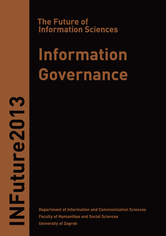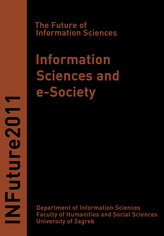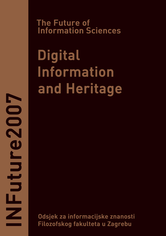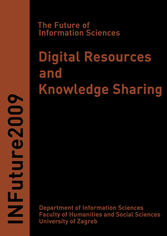INFuture2013: Information Governance - Proceedings
Editors
Anne Gilliland, University of California Los Angeles, USA
Sue McKemmish, Centre for Organisational and Social Informatics, Monash University, Australia
Hrvoje Stančić, Faculty of Humanities and Social Sciences, University of Zagreb, Croatia
Sanja Seljan, Faculty of Humanities and Social Sciences, University of Zagreb, Croatia
Jadranka Lasić-Lazić, Faculty of Humanities and Social Sciences, University of Zagreb, Croatia
Editorial board
Mihaela Banek Zorica, Faculty of Humanities and Social Sciences, University of Zagreb, Croatia
Damir Boras, Faculty of Humanities and Social Sciences, University of Zagreb, Croatia
Senada Dizdar, Faculty of Philosophy, University of Sarajevo, Bosnia and Herzegovina
Anne Gilliland, University of California Los Angeles, USA
Jadranka Lasić-Lazić, Faculty of Humanities and Social Sciences, University of Zagreb, Croatia
Vladimir Mateljan, Faculty of Humanities and Social Sciences, University of Zagreb, Croatia
Sue McKemmish, Centre for Organisational and Social Informatics, Monash University, Australia
Sanja Seljan, Faculty of Humanities and Social Sciences, University of Zagreb, Croatia
Aida Slavić, UDC Consortium, The Hague, The Netherlands
Hrvoje Stančić, Faculty of Humanities and Social Sciences, University of Zagreb, Croatia
Sonja Špiranec, Faculty of Humanities and Social Sciences, University of Zagreb, Croatia
Miroslav Tuđman, Faculty of Humanities and Social Sciences, University of Zagreb, Croatia
INFuture publishing ethics
The INFuture publication ethics statement is based on the Committee on Publication Ethics (COPE) Code of Conduct and Best Practice Guidelines.
Impressum
ISSN
ISSN 1847-8220
Reviewers
Table of contents
INFuture2011: Information Sciences and e-Society - Proceedings
Editors
Clive Billenness, KEEP Project / University of Portsmouth, UK
Annette Hemera, CSOFT International
Vladimir Mateljan, Faculty of Humanities and Social Sciences, University of Zagreb, Croatia
Mihaela Banek Zorica, Faculty of Humanities and Social Sciences, University of Zagreb, Croatia
Hrvoje Stančić, Faculty of Humanities and Social Sciences, University of Zagreb, Croatia
Sanja Seljan, Faculty of Humanities and Social Sciences, University of Zagreb, Croatia
Editorial board
Mihaela Banek Zorica, Faculty of Humanities and Social Sciences, University of Zagreb
Clive Billenness, KEEP Project / University of Portsmouth, UK
Damir Boras, Faculty of Humanities and Social Sciences, University of Zagreb
Senada Dizdar, Faculty of Philosophy, University of Sarajevo
Annette Hemera, CSOFT International
Jadranka Lasić-Lazić, Faculty of Humanities and Social Sciences, University of Zagreb
Vladimir Mateljan, Faculty of Humanities and Social Sciences, University of Zagreb
Sanja Seljan, Faculty of Humanities and Social Sciences, University of Zagreb
Aida Slavić, UDC Consortium
Hrvoje Stančić, Faculty of Humanities and Social Sciences, University of Zagreb
Sonja Špiranec, Faculty of Humanities and Social Sciences, University of Zagreb
Miroslav Tuđman, Faculty of Humanities and Social Sciences, University of Zagreb
INFuture publishing ethics
The INFuture publication ethics statement is based on the Committee on Publication Ethics (COPE) Code of Conduct and Best Practice Guidelines.
Impressum
ISBN
ISBN 978-953-175-408-8
Reviewers
Table of contents
| INFuture2011 and KEEP Project | 425-427 |
INFuture2007: Digital Information and Heritage - Proceedings
Editors
Sanja Seljan, Faculty of Humanities and Social Sciences, University of Zagreb, Croatia
Hrvoje Stančić, Faculty of Humanities and Social Sciences, University of Zagreb, Croatia
Editorial board
David Bawden, City University London, UK
Damir Boras, Faculty of Humanities and Social Sciences, University of Zagreb, Croatia
Jadranka Lasić-Lazić, Faculty of Humanities and Social Sciences, University of Zagreb, Croatia
Sanja Seljan, Faculty of Humanities and Social Sciences, University of Zagreb, Croatia
Aida Slavić, UDC Consortium
Hrvoje Stančić, Faculty of Humanities and Social Sciences, University of Zagreb, Croatia
Tomislav Šola, Faculty of Humanities and Social Sciences, University of Zagreb, Croatia
Miroslav Tuđman, Faculty of Humanities and Social Sciences, University of Zagreb, Croatia
Jože Urbania, Faculty of Arts, Ljubljana, Slovenia
INFuture publishing ethics
The INFuture publication ethics statement is based on the Committee on Publication Ethics (COPE) Code of Conduct and Best Practice Guidelines.
Impressum
ISBN
ISBN 978-953-175-305-0
Table of contents
INFuture2009: Digital Resources and Knowledge Sharing - Proceedings
Editors
Hrvoje Stančić, Faculty of Humanities and Social Sciences, University of Zagreb, Croatia
Sanja Seljan, Faculty of Humanities and Social Sciences, University of Zagreb, Croatia
David Bawden, City University London, UK
Jadranka Lasić-Lazić, Faculty of Humanities and Social Sciences, University of Zagreb, Croatia
Aida Slavić, UDC Consortium
Editorial board
David Bawden, City University London, UK
Damir Boras, Faculty of Humanities and Social Sciences, University of Zagreb, Croatia
Senada Dizdar, Faculty of Philosophy, University of Sarajevo, Bosnia and Herzegovina
Alexander Fraser, Institute for Natural Language Processing, University of Stuttgart, Germany
Steven Krauwer, Utrecht institute of Linguistics UiL-OTS, The Netherlands
Jadranka Lasić-Lazić, Faculty of Humanities and Social Sciences, University of Zagreb, Croatia
Sanja Seljan, Faculty of Humanities and Social Sciences, University of Zagreb, Croatia
Aida Slavić, UDC Consortium
Hrvoje Stančić, Faculty of Humanities and Social Sciences, University of Zagreb, Croatia
Miroslav Tuđman, Faculty of Humanities and Social Sciences, University of Zagreb, Croatia
INFuture publishing ethics
The INFuture publication ethics statement is based on the Committee on Publication Ethics (COPE) Code of Conduct and Best Practice Guidelines.
Impressum
ISBN
ISBN 978-953-175-355-5
Reviewers
Table of contents
| List of reviewers | 789-790 |
Publishing ethics
It is important to agree upon standards of expected ethical behaviour for the parties (editors, peer-reviewers, authors and publisher) involved in publishing of the peer-reviewed proceedings of the international INFuture conference. The ethics statement is based on the Committee on Publication Ethics (COPE) Code of Conduct and Best Practice Guidelines for Journal Editors.
Duties of editors:
- publication decision
- fair play
- confidentiality
- disclosure of conflicts of interest
Duties of peer-reviewers:
- contribution to editorial decision
- promptness
- confidentiality
- standards of objectivity
- acknowledgment of sources
- disclosure of conflict of interest
Duties of authors:
- reporting standards
- data access and retention
- originality and avoiding plagiarism
- avoiding multiple, redundant of concurrent publication
- acknowledgment of sources
- authorship limited only to contributors
- identifying potential hazards to human or animal subjects
- disclosure of conflict of interest
- notifying the editor if fundamental errors are discovered after publication
Duties of the publisher:
- taking appropriate measures in cases of alleged or proven scientific misconduct
- detecting plagiarism
- avoiding any kind of discrimination
- not allowing the influence of commercial revenue on editorial decisions
- communication with other journals and publishers







